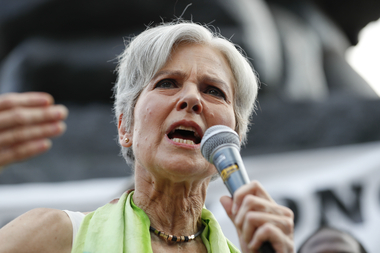US presidential hopefuls sue for access to Oklahoma ballot

OKLAHOMA CITY (AP) — Two U.S. presidential hopefuls are suing the state of Oklahoma, arguing its ballot-access laws unconstitutionally discriminate against third-party and independent candidates for president.
The lawsuit was filed last week in federal court on behalf of Green Party presidential nominee Jill Stein of Massachusetts and independent presidential candidate Roque "Rocky" De La Fuente of Florida. Three Oklahoma residents and Stein supporters also are listed as plaintiffs in the suit.
It seeks to prevent the Oklahoma Election Board from enforcing the state's ballot-access laws.
Oklahoma's ballot laws for U.S. presidential candidates require "an unnecessarily early petition filing deadline, and unnecessarily high petition signature requirement," the lawsuit states. The suit also maintains Oklahoma's laws unconstitutionally discriminate in favor of independent candidates for non-presidential statewide federal offices, like U.S. House and Senate, because those candidates only need to pay a filing fee to appear on the ballot.
Oklahoma Election Board spokesman Bryan Dean said the agency wouldn't comment on the lawsuit, which was first reported on Monday by The Journal Record newspaper.
Under current Oklahoma law, independent or third-party candidates must gather signatures from roughly 25,000 registered voters by July 15 in order to qualify for the ballot.
Oklahoma has not had a third-party candidate for president on the ballot since 2000, when Pat Buchanan ran as the Reform Party candidate and Harry Browne as the Libertarian Party candidate. An independent presidential candidate hasn't appeared on the ballot since Ross Perot in 1992.
The Libertarian Party launched a successful signature drive this year to get its nominee, former New Mexico Gov. Gary Johnson, on the ballot in Oklahoma, but the Green Party was not able to secure enough signatures, said Rachel Jackson, a spokeswoman for the Green Party in Oklahoma and a plaintiff in the lawsuit.
"Because the requirements are so extraordinarily difficult and, frankly, unconstitutional, many times we're aware of the fact that we're not going to get on the ballot, so we use the petition effort as a way to generate awareness about how our ballot access laws limit democracy here," Jackson said.
While Oklahoma's laws make it difficult to get independent or third-party presidential candidates on the ballot, they have been changed to make it easier in recent years. In 2015, lawmakers passed a bill to lower the signature requirement to get a candidate on the ballot from 5 percent to 3 percent of the votes cast in the most recent presidential election.
And earlier this year, the Legislature made another change to lower the requirement for third parties, like the Libertarian Party, to remain recognized in Oklahoma from 10 percent of the votes cast for president or governor to 2.5 percent. Under that new law, the Libertarian Party will remain a recognized party if Johnson receives at least 2.5 percent of the vote in November.
___
SEAN MURPHY, Associated Press
Copyright 2016 The Associated Press. All rights reserved. This material may not be published, broadcast, rewritten or redistributed.
Copyright 2016 The Gayly - 8/16/2016 @ 10:29 a.m. CDT





